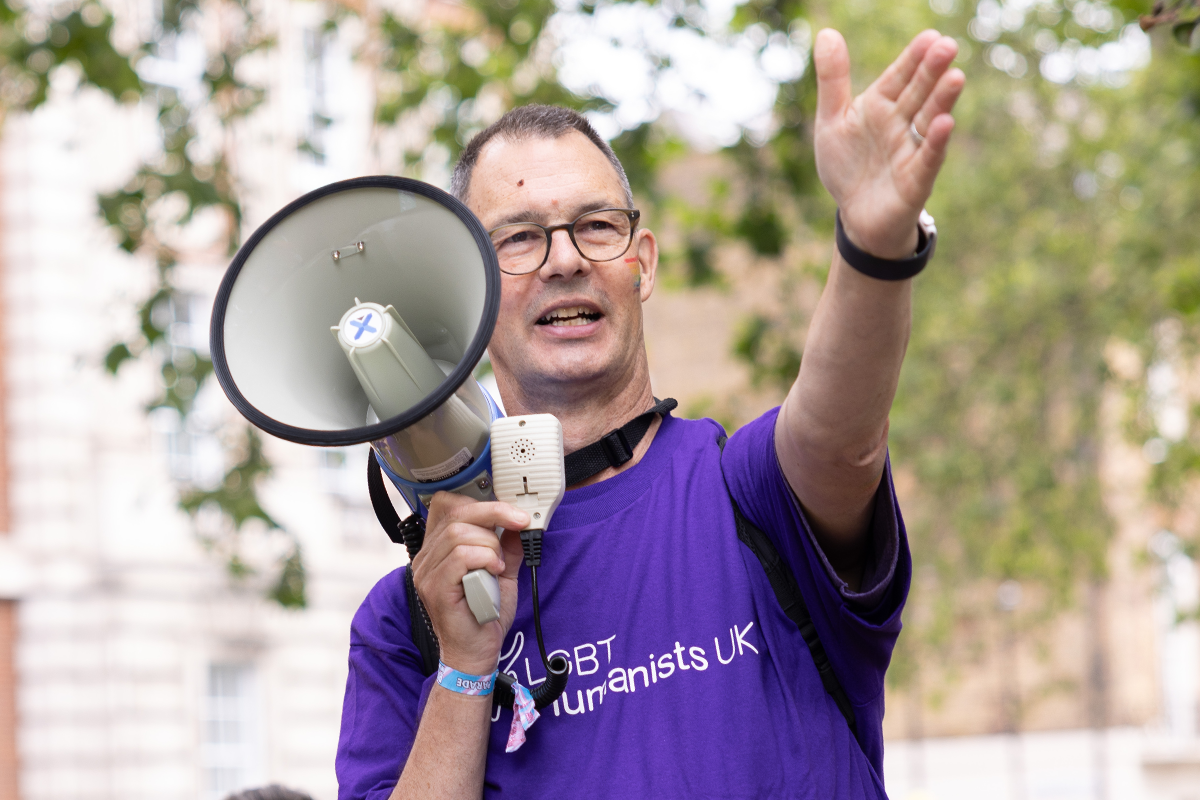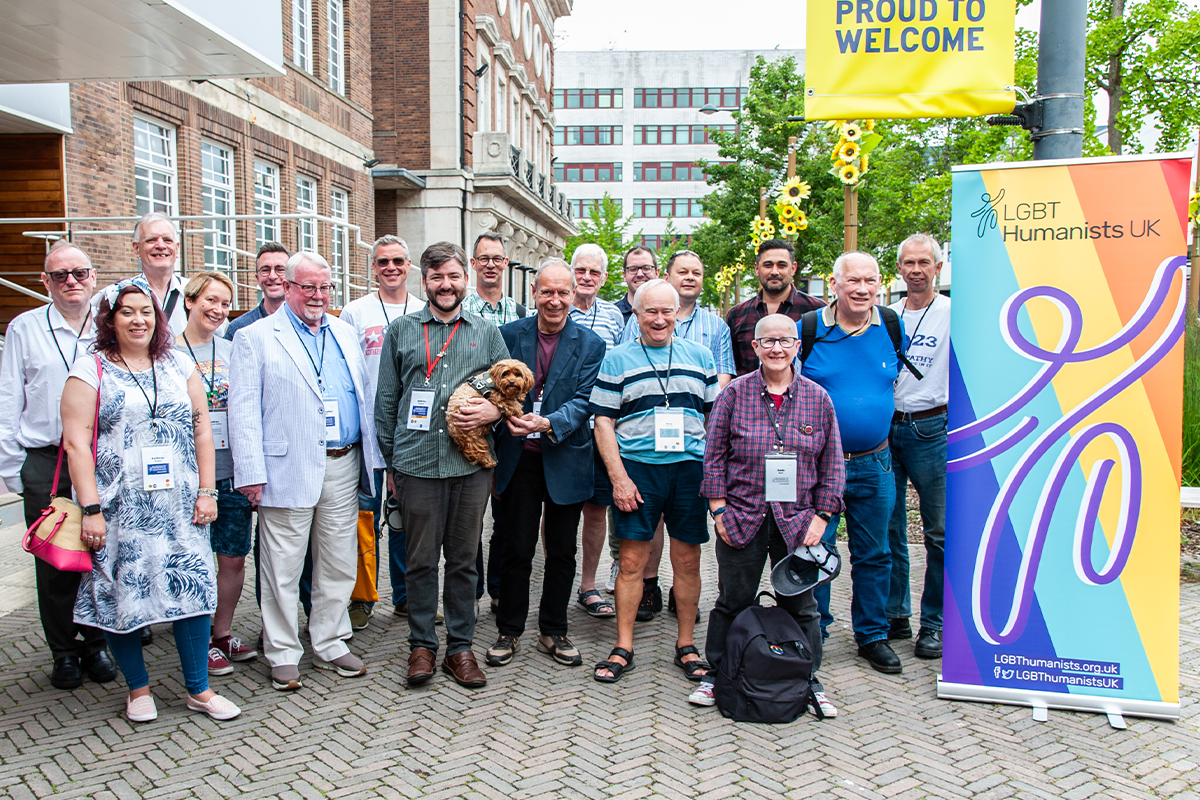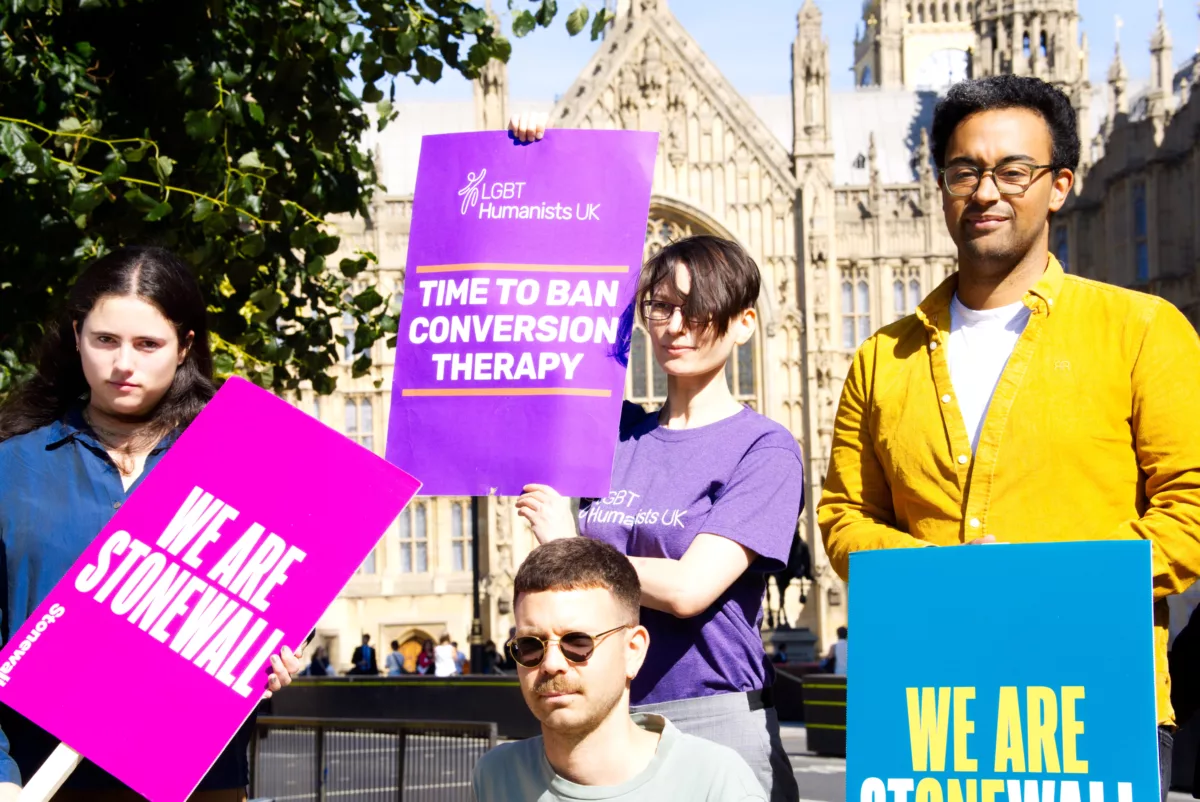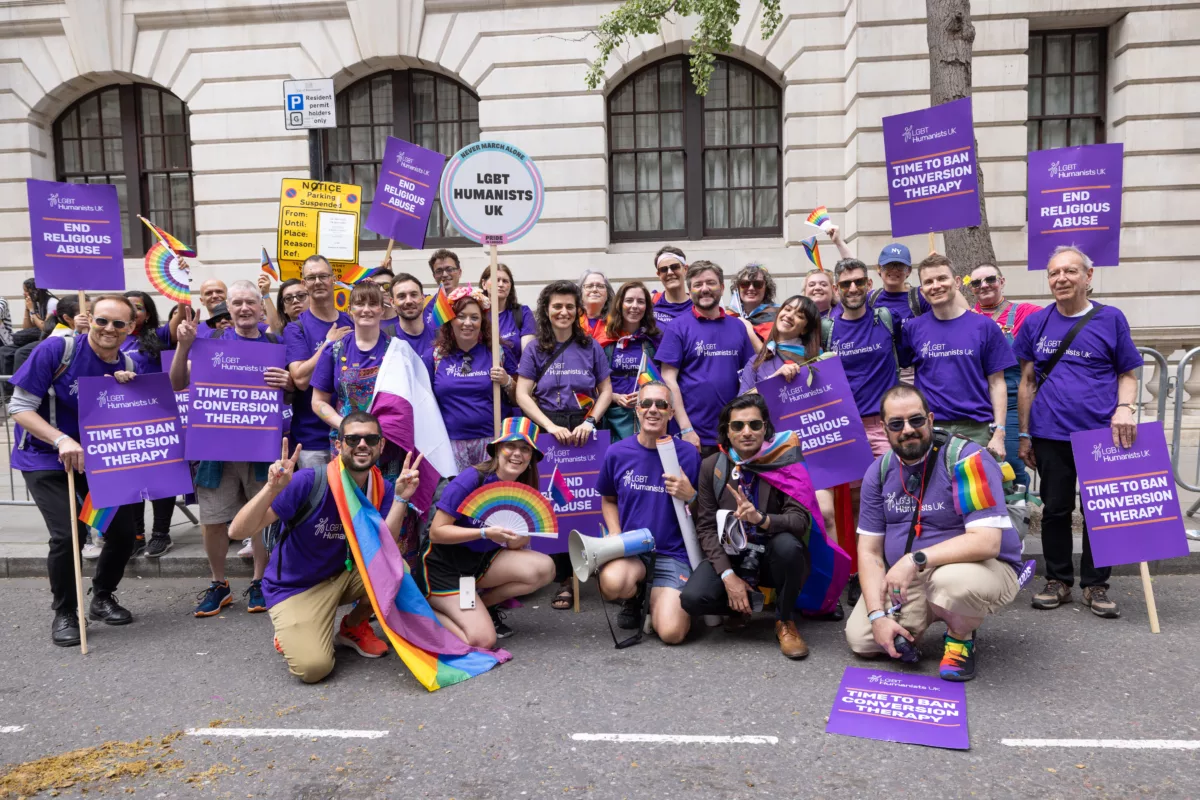
For National Coming Out Day, we caught up with Nick Baldwin, the Coordinator of LGBT Humanists – Humanists UK’s section which has campaigned for LGBT rights for nearly 45 years. Nick, who once lived as a closeted and married Baptist minister, now embraces his identity as an openly gay humanist. We spoke to Nick about his transformative path of coming out and embracing humanism, what the work of LGBT Humanists means to him, and the urgent need to ban conversion therapy – something Nick himself was subjected to.
Thanks for joining us, Nick. First off, when did you first realise you were a humanist?
I had a growing awareness in 2011, after I left the Baptist church. But by 2014, I realised I was actually humanist in my thinking and worldview. Funnily enough, I clicked on the Humanists UK website and took the quiz ‘How humanist are you?’, and scored about 95% and thought, oh right that’s what my outlook on life is now and it feels good and right!
How difficult was it for you to leave your church?
It was a slow process that took years. They say that coming out is the gift that keeps on giving. My first coming out was to myself, to look myself in the mirror and say, ‘Hi Nick, I’m a gay man and that’s OK.’ I’d had some tremendously supportive and open online counselling that helped me get to that point. It was clear that being queer and in the evangelical church was incompatible. But it took me a long time from that point to leave the church. I wasn’t just in the church, I was the minister or pastor in a church, so it was complicated since my job, stipend, house and family were all tied up in the church. I felt trapped and didn’t know how to come out or extricate myself. By 2011, I was not only clear in my own mind that I was gay, but also that I didn’t believe the evangelical teachings and neither did I want to stay married to my wife. I came out to my wife and children, resigned as the minister, left the church, and moved away. It was very tough and I am very conscious of the hurt and confusion I left behind, particularly for the people I loved and cared for. Yet, at the age of 48, I felt comfortable in my own skin, at last, and that was a wonderful and liberating experience.

What did you do after leaving your job as a Baptist minister?
I looked for new employment. I asked myself what I was good at and what I enjoyed. Administration had been a key part of my charity and church life so I started to look in that field, and had also relocated to Oxford by the middle of 2011 so was lucky enough to get a full-time post in the University of Oxford in their medical sciences division as an administrator. I worked in four different departments over the next 11 years, finishing up as head of administration and finance for student welfare and support which was a great fit with lots of my past work and experience.
Leaving your church meant leaving behind a community, were you able to find a sense of community elsewhere?
It’s been tremendous to find new LGBT friends in the University of Oxford that is a very diverse and inclusive employer, among the humanists and so many accepting and open people and friends for whom me being gay is simply not an issue. I am lucky enough to have met my husband and we had an outstanding humanist celebrant for our wedding in 2016. Inspired by our wonderful celebrant and building on my own skills and experiences I am soon to take a training course and be accredited by Humanist Ceremonies as a celebrant myself.

You’ve come on board this year as the Coordinator of LGBT Humanists. Why is LGBT Humanists important to you?
LGBT Humanists is a section of Humanists UK and is run by volunteers with brilliant support from the Humanists UK staff team. We are LGBT people who support humanist values and we are humanists who support LGBT rights. In a nutshell, we want lesbian, gay, bisexual, and trans people to enjoy equal rights to everyone else. We support and inform each other online and in-person with our fantastic events, at Pride parades across the country, and by joining protests with other LGBT charities.
What campaigns is LGBT Humanists currently working on?
We are campaigning to secure a legislative ban which makes conversion therapy illegal. We are calling on the UK Government to grant legal recognition to humanist marriages in England and Wales immediately. This particularly impacts LGBT people since we are more likely to have a humanist ceremony and at the moment in England and Wales we need to go to a registrar’s office as well to be legally partnered. We are also keenly aware of the need to defend the Equality Act and the protection it gives all LGBT people. At the moment, preparations are also under way for the annual LGBT Humanists Trans Day of Remembrance event, a humanist ceremony in London each year that reflects on lives lost to transphobic violence around the world.

When it comes to the campaign on conversion therapy ban, you have a personal insight into how this affects people in the UK. Can you tell us more about that?
As a church member I went to my minister in my thirties and said I thought I might be gay and that I didn’t want to be. He then took me through six or so months of ‘prayer counselling’. This means meeting once a week early in the morning in order to ‘eradicate my homosexual tendencies’. I was told I needed to repent both of gay feelings and of any physical sins. I was told homosexuality was an abominable sin and god hated it and by implication me. Of course it didn’t work, but in the short term it increased my sense of shame, self-hatred and deeply ingrained guilt as after a while I realised those gay feelings hadn’t gone away. The fact that I willingly submitted to this prayer counselling doesn’t mean it wasn’t abuse. There was no hint of exploring what it might mean to be gay or that being something to be celebrated. It took me many years, as I have said, to understand that there was another way of looking at the world and for me to learn to accept and celebrate being the person I am, gay and proud.
What does it mean to you to have a humanist approach to life?
Science and human reason are invaluable tools to be applied to all areas of life as a humanist. I like that observation and critical thinking are central to the humanist approach. So, I no longer believe in divine beings nor the supernatural. This life is the only life we have. As John Lennon sang, there is no heaven or hell below us, only sky. For me, one of the most attractive and compelling parts of being a humanist is emphasising our individual moral autonomy. We can work out what is right or wrong by looking at what human beings are actually like, and what will help them flourish in this world. This links with my coming out those years ago since it was the realisation that I wasn’t trapped but had autonomy and agency to make choices and changes in my life which was empowering and liberating as a human being.

Do you have any advice for people who want to come out but aren’t sure how?
Gosh! We all have our own personal journeys. I would say seek out someone who can help you talk through your experiences and feelings in an open and non-judgmental approach. I actually spoke to my own doctor in complete confidence, another one of my coming out gifts as they were so supportive. My GP referred me to a counselor who was awesome. And, if you are part of a high-control religious group, please reach out to Faith to Faithless, Humanists UK’s programme that helps people questioning or leaving religions in those circumstances, who are sometimes labelled ‘apostates’.
Thank you for your time, Nick.

Notes
For further comment or information on LGBT Humanists, contact coordinator@lgbthumanists.org.uk
Read more about our work on banning conversion therapy.
Find out more about LGBT Humanists.
Humanists UK is the national charity working on behalf of non-religious people. Powered by 110,000 members and supporters, we advance free thinking and promote humanism to create a tolerant society where rational thinking and kindness prevail. We provide ceremonies, pastoral care, education, and support services benefitting over a million people every year and our campaigns advance humanist thinking on ethical issues, human rights, and equal treatment for all.
